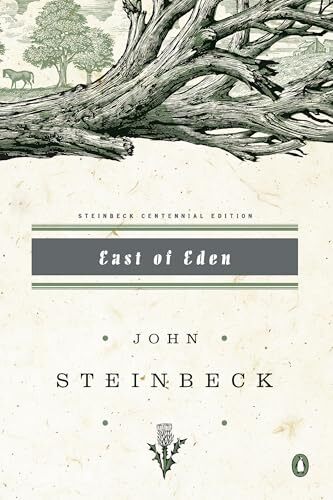
The good
-
An interesting look at the end of the 19th century and beginning of the 20th century in America, including immigration, farming, chain gangs, the arrival of cars, the Civil War, and World War I.
-
Good writing.
-
Some beautiful, touching scenes.
-
Unique, memorable characters (especially Cathy, Lee, Samuel). Note that this is also a downside, as I’ll discuss later.
-
Fascinating discussion of the story of Cain & Abel and the idea of “thou mayest” (i.e., you can choose to break the cycle).
(spoiler alert)
Perhaps more importantly, the book itself retells the story of Cain & Abel, twice: once with Charles & Adam and once with Caleb and Aron. This mostly works for the narrative, though it too has some drawbacks.
The not so good
-
I couldn’t relate to a single one of the characters in the book. There were a lot of interesting and unique characters, but none of them acted like anyone I’ve ever met in my entire life, and they didn’t feel human (especially the female characters). Every decision and sentence they uttered felt artificial, like something designed for a novel, and not something any real person would say.
-
The book has an interesting setting and interesting characters, but a drawn out, meandering plot. To be honest, I’m not a fan of multi-generational family epics, so this might just be a question off personal taste.
-
The book builds up to important events—e.g., various war, some murders, a few big reveals—but then skips over them, jumping forward in time, and merely implying those events happened through the way characters are now acting, and rarely showing the events themselves. This makes sense in some cases, but can be quite frustrating in others.
-
After finishing the book, I had trouble verbalizing what it was really about. Even discussing what themes the book explored was tricky. Love? Good vs evil? Family? Religious allegory? I guess the book touches on all of these, but as I couldn’t connect with any of the characters, and couldn’t connect them to anyone I know in real life, I struggled to take away any life-changing lessons.
Overall
An interesting read with a few great parts, but it didn’t come together for me as a whole.
Quotes
As always, I saved a few quotes from the book:
And now that you don’t have to be perfect, you can be good.
But the Hebrew word, the word timshel—’Thou mayest’— that gives a choice. It might be the most important word in the world. That says the way is open. That throws it right back on a man. For if ‘Thou mayest’—it is also true that ‘Thou mayest not.’
Do you take pride in your hurt? Does it make you seem large and tragic? …Well, think about it. Maybe you’re playing a part on a great stage with only yourself as audience.
When a man says he does not want to speak of something he usually means he can think of nothing else.
